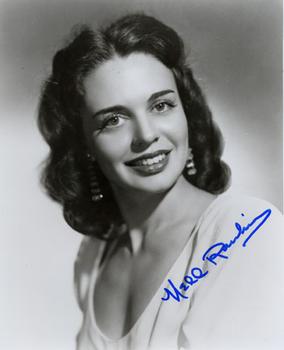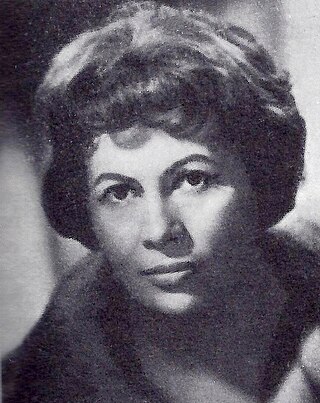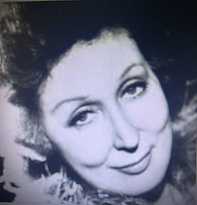Related Research Articles
A mezzo-soprano or mezzo (; Italian:[ˌmɛddzosoˈpraːno]; meaning "half soprano") is a type of classical female singing voice whose vocal range lies between the soprano and the contralto voice types. The mezzo-soprano's vocal range usually extends from the A below middle C to the A two octaves above (i.e. A3–A5 in scientific pitch notation, where middle C = C4; 220–880 Hz). In the lower and upper extremes, some mezzo-sopranos may extend down to the F below middle C (F3, 175 Hz) and as high as "high C" (C6, 1047 Hz). The mezzo-soprano voice type is generally divided into the coloratura, lyric, and dramatic.

Nell Rankin was an American operatic mezzo-soprano. Though a successful opera singer internationally, she spent most of her career at the Metropolitan Opera, where she worked from 1951 to 1976. She was particularly admired for her portrayals of Amneris in Verdi's Aida and the title role in Bizet's Carmen. Opera News said, "Her full, generous tone and bold phrasing, especially in the Italian repertory, were unique among American mezzos of her generation.
Stoyanka Savova Nikolova, best known by her stage name Elena Nicolai, was a Bulgarian operatic mezzo-soprano.

Fiorenza Cossotto is an Italian operatic mezzo-soprano.
Mirella Parutto is an Italian operatic soprano and later mezzo-soprano.
Dolora Zajick is an American mezzo-soprano opera singer who specializes in the Verdian repertoire. Zajick has been described as having "one of the greatest voices in the history of opera".
Stefania Toczyska, born in Grudziądz, Poland, on 19 February 1943, is a Polish mezzo-soprano of international repute.

Biserka Cvejić was a Serbian operatic mezzo-soprano and contralto, and university professor, of Croatian descent. Her career began at the Belgrade Opera in 1954. She was a member of the Vienna State Opera from 1959 to 1979, performing internationally. She first appeared at the Metropolitan Opera in 1961 as Amneris in Verdi's Aida, returning in many more leading roles of the Italian and French repertoire.
Ivanka Ninova is a Bulgarian mezzo-soprano opera singer born in Vidin.

Viorica Cortez is a noted Romanian-born mezzo-soprano, later French by naturalisation. Starting her operatic and concert career in the mid-1960s, she went on to become one of the most prominent female performers of the '70s and '80s. An example of professional longevity, she is present on some of the most prestigious European opera scenes.

Miriam Pirazzini was an Italian mezzo-soprano and occasionally soprano. She made her formal debut in Rome, in 1944, as Laura Adorno in La Gioconda. For the next twenty years, she was one of Italy's foremost mezzo-sopranos.
Janet Coster is an English operatic mezzo-soprano.
Margaret Harshaw was an American opera singer and voice teacher who sang for 22 consecutive seasons at the Metropolitan Opera from November 1942 to March 1964. She began her career as a mezzo-soprano in the early 1930s but then began performing roles from the soprano repertoire in 1950. She sang a total of 39 roles in 25 works at the Met and was heard in 40 of the Metropolitan Opera radio broadcasts. She was also active as a guest artist with major opera houses in Europe and North and South America.

Elena Cernei was a Romanian operatic mezzo-soprano, musicologist, and voice teacher. During her 25-year career as an opera singer, she sang in leading opera houses in both Europe and North America. In 1963, she was made Artistă Emerită of the Republic of Romania and in 1999 received the degree of Doctor Honoris Causa from the National University of Music Bucharest for her contributions to the field of musicology.
Marta Moretto is an Italian operatic lyric mezzo-soprano, who was born in Padua.

Franca Mattiucci is an Italian operatic mezzo-soprano who had an active international career from 1963 to 1987. In her native country she made appearances at the Arena di Verona Festival, the Baths of Caracalla, La Fenice, La Scala, the Teatro Comunale di Bologna, the Teatro della Pergola, the Teatro dell'Opera di Roma, the Teatro di San Carlo, the Teatro Donizetti, the Teatro Margherita, the Teatro Massimo Bellini, the Teatro Massimo, the Teatro Regio di Parma, and the Teatro Regio di Torino. On the international stage she performed at the Hamburg State Opera, the Hungarian State Opera, the Liceu, the Lyric Opera of Chicago, the Opéra de Monte-Carlo, the Sofia National Opera, the Teatro Colón, the Teatro Nacional de São Carlos, the Teatro Real, and the Vienna State Opera among others.

Mignon Dunn is an American dramatic mezzo-soprano and voice teacher.
Ekaterina Semenchuk, is a Belarusian operatic mezzo-soprano.

Agnieszka Rehlis is a Polish operatic mezzo-soprano who has made an international career. She is known for portraying Verdi characters including Amneris and Azucena. She participated in music by Krzysztof Penderecki, including the world premiere of his Eighth Sinfonie and the Grammy Award–winning collection Penderecki Conducts Penderecki.
Elena Manistina is a Russian operatic mezzo-soprano. She is a member of the Bolshoi Theatre and has appeared in many operas internationally. She also appeared as Verdi's Azucena at the Metropolitan Opera, the Deutsche Oper Berlin and Opéra Bastille, and as Amneris at the Arena di Verona.
References
- 1 2 3 4 5 6 Stimpson, Mansel (April 2010). "Going Deeper than Before: Marianne Cornetti and Aida". Classical Source. Retrieved 2021-10-31.
- 1 2 3 4 5 6 7 8 9 10 "Mezzo-soprano Marianne Cornetti on her Royal Opera debut in Don Carlo". Musical Criticism (Interview). Interviewed by Dominic McHugh. 2009-09-03.
- 1 2 3 4 "Beyond the Bio: A conversation with Marianne Cornetti". Athlone Artists (Interview). Retrieved 2021-10-31.
- 1 2 3 Rutkoski, Rex (2003-08-09). "Cornetti follows opera dream". Pittsburgh Tribune-Review. Retrieved 2021-10-19.
- ↑ "Visit to Knoch High School a homecoming for opera singer" . Pittsburgh Post-Gazette. 2005-12-18. Retrieved 2023-07-15.
- ↑ Croan, Robert (2002-12-01). "Music Preview: Star pupils sing praises of opera training". Pittsburgh Post-Gazette. Archived from the original on March 15, 2016.
- 1 2 3 "The Diva's Progression to the Sacred Fire : Marianne Cornetti" (Interview). Interviewed by Daniel Vasquez. 2012-05-01.
- ↑ "Il Matrimonio Segreto - Wolf Trap Opera Company". 1991-07-12. "Thais - Washington Concert Opera". 1991-09-16. "La Finta Giardiniera - Wolf Trap Opera Company". 1992-07-08. "'El gato montés': The Cat's Meow". The Washington Post. 1996-10-30.
- ↑ Tommasini, Anthony (2010-10-27). "Racette and Lucic in 'Il Trovatore' at the Met - Review". The New York Times. Retrieved 2023-07-15.
- ↑ "Classical Music/Opera Listings for Nov. 11 — 17". The New York Times. 2011-11-10.
- ↑ "Adriana Lecouvreur 2002". Teatro dell'Opera di Roma. Retrieved 2023-07-15.
- ↑ Rabinowitz, Chloe (2019-11-22). "Pittsburgh Festival Opera's Board of Directors Appoints Marianne Cornetti as New Artistic Director". BroadwayWorld.
- ↑ "Marianne Cornetti - School of Music". cmu.edu. Retrieved 2021-10-19.
- ↑ "Carlow University Names Five Women Women of Spirit® Awardees to Be Honored at April 2016 Gala". Carlow University. 2016-01-01. Retrieved 2023-07-15.
- ↑ "Fanfare: Carlow University's Women of Spirit Awards Program". Pittsburgh Tribune-Review. 2016-04-10.